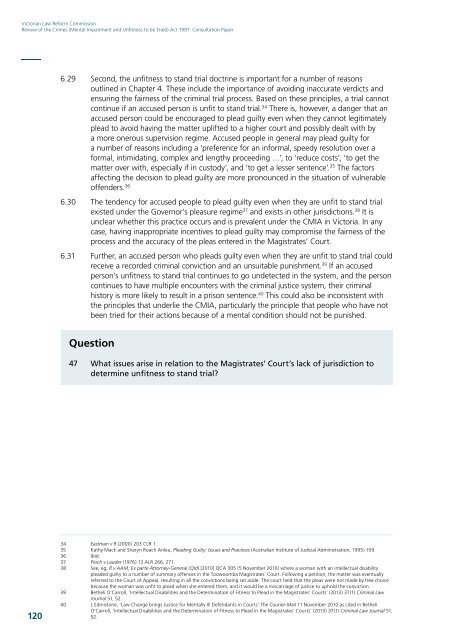Crimes Mental Impairment consultation paper.pdf - Victorian Law ...
Crimes Mental Impairment consultation paper.pdf - Victorian Law ...
Crimes Mental Impairment consultation paper.pdf - Victorian Law ...
Create successful ePaper yourself
Turn your PDF publications into a flip-book with our unique Google optimized e-Paper software.
<strong>Victorian</strong> <strong>Law</strong> Reform Commission<br />
Review of the <strong>Crimes</strong> (<strong>Mental</strong> <strong>Impairment</strong> and Unfitness to be Tried) Act 1997: Consultation Paper<br />
6.29 Second, the unfitness to stand trial doctrine is important for a number of reasons<br />
outlined in Chapter 4. These include the importance of avoiding inaccurate verdicts and<br />
ensuring the fairness of the criminal trial process. Based on these principles, a trial cannot<br />
continue if an accused person is unfit to stand trial. 34 There is, however, a danger that an<br />
accused person could be encouraged to plead guilty even when they cannot legitimately<br />
plead to avoid having the matter uplifted to a higher court and possibly dealt with by<br />
a more onerous supervision regime. Accused people in general may plead guilty for<br />
a number of reasons including a ‘preference for an informal, speedy resolution over a<br />
formal, intimidating, complex and lengthy proceeding …’, to ‘reduce costs’, ‘to get the<br />
matter over with, especially if in custody’, and ‘to get a lesser sentence’. 35 The factors<br />
affecting the decision to plead guilty are more pronounced in the situation of vulnerable<br />
offenders. 36<br />
6.30 The tendency for accused people to plead guilty even when they are unfit to stand trial<br />
existed under the Governor’s pleasure regime 37 and exists in other jurisdictions. 38 It is<br />
unclear whether this practice occurs and is prevalent under the CMIA in Victoria. In any<br />
case, having inappropriate incentives to plead guilty may compromise the fairness of the<br />
process and the accuracy of the pleas entered in the Magistrates’ Court.<br />
6.31 Further, an accused person who pleads guilty even when they are unfit to stand trial could<br />
receive a recorded criminal conviction and an unsuitable punishment. 39 If an accused<br />
person’s unfitness to stand trial continues to go undetected in the system, and the person<br />
continues to have multiple encounters with the criminal justice system, their criminal<br />
history is more likely to result in a prison sentence. 40 This could also be inconsistent with<br />
the principles that underlie the CMIA, particularly the principle that people who have not<br />
been tried for their actions because of a mental condition should not be punished.<br />
Question<br />
47 What issues arise in relation to the Magistrates’ Court’s lack of jurisdiction to<br />
determine unfitness to stand trial<br />
120<br />
34 Eastman v R (2000) 203 CLR 1.<br />
35 Kathy Mack and Sharyn Roach Anleu, Pleading Guilty: Issues and Practices (Australian Institute of Judicial Administration, 1995) 109.<br />
36 Ibid.<br />
37 Pioch v Lauder (1976) 13 ALR 266, 271.<br />
38 See, eg, R v AAM; Ex parte Attorney-General (Qld) [2010] QCA 305 (5 November 2010) where a woman with an intellectual disability<br />
pleaded guilty to a number of summary offences in the Toowoomba Magistrates’ Court. Following a petition, the matter was eventually<br />
referred to the Court of Appeal, resulting in all the convictions being set aside. The court held that the pleas were not made by free choice<br />
because the woman was unfit to plead when she entered them, and it would be a miscarriage of justice to uphold the conviction.<br />
39 Betheli O’Carroll, ‘Intellectual Disabilities and the Determination of Fitness to Plead in the Magistrates’ Courts’ (2013) 37(1) Criminal <strong>Law</strong><br />
Journal 51, 52.<br />
40 L Edmistone, ‘<strong>Law</strong> Change brings Justice for <strong>Mental</strong>ly Ill Defendants in Courts’ The Courier-Mail 11 November 2010 as cited in Betheli<br />
O’Carroll, ‘Intellectual Disabilities and the Determination of Fitness to Plead in the Magistrates’ Courts’ (2013) 37(1) Criminal <strong>Law</strong> Journal 51,<br />
52.

















